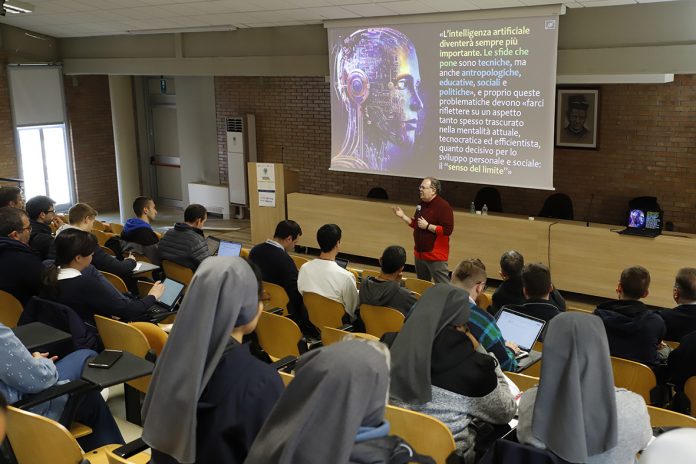Rome (Italy). On 3 and 4 April 2023, in Rome, at the Salesian Pontifical University (UPS), the XIV edition of the Salesian Days of Social Communication,
formative appointment on the issues related to communication organized by the Dicastery for Social Communication of the Salesians of Don Bosco, the Communication Sector of the Institute of the Daughters of Mary Help of Christians, the Faculty of Social Communication Sciences of the UPS, and the Pontifical Faculty of Education «Auxilium» of Rome.
Charism and Mission. Faithful to the roots and innovative to incarnate in today’s time, is the theme deepened during the Days by about 140 young people in formation, with their formators
In the afternoon of 3 May, after the greeting of Fr. Andrea Bozzolo, Rector Magnificent of the UPS, the participants were led to the “roots of the Charism” by Fr. Carlo Maria Zanotti, Salesian of Don Bosco, and Sister Eliane Petri Anschau, who deepened the “Uniqueness and actuality of the Charism today” respectively in Don Bosco and in Mother Mazzarello.
“Mature humanity, sensitivity capable of capturing the questions of young people, serious commitment to work for souls” are the traits of Don Bosco that Fr. Carlo Maria Zanotti drew from the famous volume of Fr. Pietro Brocardo, “Don Bosco, Profoundly holy man”, to leave to the young formandees and some valuable attitudes for consecrated life and for the apostolate among young people: a “dynamic” balance, in a journey of openness and progressive growth, keeping in mind today and its challenges; the sensitivity, typical of Don Bosco, in capturing the questions, labors, disappointments, dreams, desires of young people, which derives from his being “with” and “among” them, to know them and look at them with the same gaze of God. The third aspect is intelligent and wise synergy – today we would say synodality – to make the commitment to young people concrete and effective. “At the center were always the young people and passion for their salvation. It was a passion that Don Bosco knew how to transmit to those who approached him,” stressed Fr. Carlo. He asked, “can we can say like Don Bosco that ‘every breath’ is for the young people?”
To the young formandees, he left some passages for a timely charismatic experience embodied in today: care for the harmony and connection between the human and the spiritual; cultivate a strong interiority; form a “relational competence” in a context of “lost hope”, of distrust of the future, and fear. And still to proclaim, in a relationality that speaks, that provokes, that infuses hope, joy, optimism, trust.
The relational aspect also emerged from the intervention of Sister Eliane Petri who, based on the Letters of Mother Mazzarello, spoke of the FMA Institute’s co-founder as an educator and woman of relationships. “This form of relational communication is realized in a particular way in educative accompaniment, in which Mary Domenica is particularly skilled. She was an expert teacher of the spirit. This communicative capacity of persuasion for the good comes from the witness of life”. Mother Mazzarello, in fact, believed very much in the power of example to communicate the good and the beautiful and to educate to life and to the great values. “If I love Jesus with all my heart, I will also make Him loved by others” (L11,2).
After leaving some educative aspects emerging from the experience of MM and the first community of Mornese, Sister Eliane concluded by taking a look at the contemporary world and observing that, “The community of Mornese is a model of an ‘educating community present’, not indifferent to the life that lives around them. Even today, communication is the educational way to give back to all equal dignity and voice, essence and protagonism, to communicate the good well.” She then invited all to “rethink the quality of educative relationships, to be the ‘epiphany of God’s love’, a sign of hope, a help to raise the gaze of young people towards great dreams,” educating them to resilience and hope.
The work continued in the groups, where it was shared from the questions left in the nelle “Video-pills” charismatic offers in preparation for the event and the reflections heard by the speakers. One of the themes that most touched the young formandees is the care of interiority within the daily commitments. “We too are young people immersed in this society. It is not easy to be always aware of the dynamism that moves us and to choose Jesus daily, to be in the world and not to belong to it,” one group said.
In the evening, was offered the viewing of a video on the impacts of the use of devices and social networks on the brain of preteens and adolescents and their behaviors. In some cases, they may lead to serious consequences, up to putting their lives in danger. The importance emerged of knowing the data and trends to act effectively through the relationship with young people and strengthening alliances with the family, school, and other educational agencies.
The second day began with the Eucharistic Celebration presided over by Fr. Gildásio Mendes dos Santos, World Councilor for Social Communication of the Salesians who highlighted the word ‘open’. “When the child’s eyes open, there is the first communication with the mother, their gazes meet. And so too the Resurrection is the act of opening: opening eyes, heart, soul, to experience the Risen Christ.”
Addressing each one, Fr. Gildasio asked, “As a communicator, what is your experience of opening your heart, your hands, your life in the formative/communicative process? Your gifts, your talents, your ability to narrate your experience without imitating…the art of opening up to others, with creativity and originality.” Concluding the homily, he stressed that “there is no experience of resurrection without the community experience” and encouraged them to “not be afraid of what is human,” because God is found there.
Subsequently, in the assembly, Fr. Fabio Pasqualetti, Dean of the Faculty of Communication of the UPS and Consultor of the Dicastery for Communication of the Holy See, commented on the Message of the Holy Father for the World Day of Social Communications (GMCS) 2024: Artificial Intelligence and wisdom of the heart: for fully human communication.
Fr. Fabio first of all framed the Message along the line of Pope Francis, of a communication “at the service of the culture of encounter”, with the heart at the center, the seat of the encounter with God. Starting from a question,“How can we remain fully human and direct the change in progress towards the good?” He then envisaged the risks and advantages of artificial intelligence and other technical and scientific evolutions, recalling the importance and responsibility for every educator to know the social and political problems, to incarnate self in reality, to be, as consecrated persons, generative fathers and mothers, remaining fully human.
Inside a world by now regulated by algorithms, the human being – it has evidenced – remains the fundamental variable. Hence the need for consecrated persons to be prophetic, to know how to read history, to intuit its direction. Addressing the theme of pastoral care on social media, he stressed the importance of being, in addition to credible witnesses, competent communicators who do not improvise and do not isolate themselves, because “our humanity depends on the ability to experience in depth” and also to have a “spiritual gaze”, like Mother Mazzarello and Don Bosco.
Yet it has emerged that human thought – for good ends, for the common good – is indispensable in the design of technology, which today is no longer just a means, but has become a system; and in the management of knowledge, which is not just a technical concept. An example can be sociological research in which statistical data are important, but even more, relational ones, “if you want to know young people, you must be together.”
Among the many issues that emerged: ethical and legislative issues, protection of privacy and personal data, environmental sustainability, big data and the world of information, etc., Fr. Fabio stressed the importance of growing in humanity and facing the challenge of “making a qualitative leap to be up to a complex, multi-ethnic, pluralist, multi-religious, and multicultural society,” starting from religious communities that can live the prophecy of ‘together’ by putting in service and enhancing talents, with a truly symphonic participation.
The reflection of the two Days was further enriched by the workshops proposed: “Pastoral care in digital culture and AI” (Fabio Bolzetta); “Praying today, its meaning and how to do it” (House of Prayer San Biagio); “Affectivity and sexuality in celibacy” (Paolo Gambini); “Salesians in the social world” (Ermanno Giuca and Chiara Montesano); “Artificial intelligence and information” (Andrea Tomasi).
Photos: Flickr FMA




















